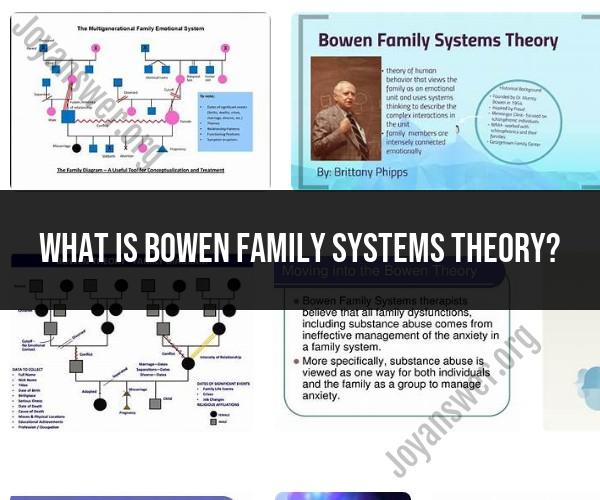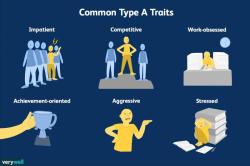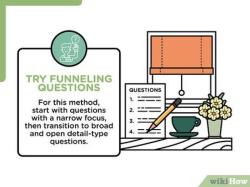What is Bowen family systems theory?
Bowen Family Systems Theory, developed by psychiatrist Murray Bowen in the 1950s, is a psychological theory that focuses on understanding family dynamics and the interplay of individual members within a family system. This theory is part of the broader field of family systems theory, which examines how families function as interconnected and interdependent units.
Key concepts of Bowen Family Systems Theory include:
Differentiation of Self: This concept refers to an individual's ability to separate their own thoughts and emotions from those of their family members. Higher levels of differentiation lead to greater emotional maturity and resilience.
Triangles: Bowen believed that when tension or conflict arises between two family members, a third person or issue often becomes involved in an attempt to reduce anxiety. These "triangles" can complicate relationships and affect family dynamics.
Nuclear Family Emotional System: This concept describes patterns of emotional functioning within nuclear families (parents and children). It explores how unresolved emotional issues from the past can affect current family dynamics.
Family Projection Process: This process involves parents projecting their own unresolved emotional issues onto their children. These issues can be related to anxiety, expectations, or other emotional challenges.
Multigenerational Transmission Process: This concept explores how emotional patterns and issues are passed down from one generation to the next within a family system. It highlights the intergenerational nature of emotional patterns.
Sibling Position: Bowen suggested that an individual's position among their siblings (e.g., oldest, middle, youngest) could influence their personality traits and behaviors.
Emotional Cutoff: Emotional cutoff occurs when individuals distance themselves from their families of origin in an attempt to reduce emotional intensity or conflict. This can affect relationships and unresolved emotional issues.
Societal Emotional Process: Bowen expanded his theory to include the broader societal context, suggesting that societal norms and pressures can influence family dynamics.
Bowen Family Systems Theory is used by therapists and counselors to help individuals and families understand and address issues within the family system. It encourages individuals to develop greater emotional awareness, differentiation, and the ability to manage family relationships more effectively. By exploring the interplay of family members and their emotional patterns, individuals and families can work toward healthier relationships and improved overall functioning.
Bowen Family Systems Theory: A Comprehensive Overview
Bowen Family Systems Theory is a theory of human behavior that views the family as an emotional unit and uses systems thinking to describe the unit's complex interactions. It is a holistic approach that considers the individual, the family, and the community as interconnected systems.
Bowen's theory is based on the following key concepts:
- Differentiation of self: This is the ability to think and feel independently of others. People with high differentiation of self are able to take responsibility for their own thoughts, feelings, and actions, and they are less likely to be reactive to the emotions and behaviors of others.
- Triangles: Triangles are emotional patterns that involve three people. Triangles can be healthy or unhealthy, but they are often associated with conflict and tension.
- Cutoff: Cutoff is a process of emotionally disconnecting from family members. Cutoff can be a healthy coping mechanism in some cases, but it can also be a sign of unresolved emotional issues.
- Multigenerational transmission process: This is the process by which unresolved emotional issues are passed down from one generation to the next. Bowen believed that our emotional heritage is a powerful force in our lives, and that understanding our family history can help us to understand ourselves better.
Bowen Family Systems Theory has been used to treat a wide range of mental health problems, including anxiety, depression, relationship problems, and substance abuse. It is also used in educational settings and in the workplace to help people understand and improve their relationships with others.
Understanding Bowen's Family Systems Theory: Key Concepts
- Differentiation of self: Differentiation of self is a key concept in Bowen Family Systems Theory. It is the ability to think and feel independently of others, and to take responsibility for one's own thoughts, feelings, and actions. People with high differentiation of self are less likely to be reactive to the emotions and behaviors of others.
- Triangles: Triangles are emotional patterns that involve three people. They can be healthy or unhealthy, but they are often associated with conflict and tension. In a triangle, one person may feel anxious or uncomfortable, and they may try to pull away from the relationship. This can lead to the other two people becoming closer, which can make the anxious person feel even more isolated.
- Cutoff: Cutoff is a process of emotionally disconnecting from family members. Cutoff can be a healthy coping mechanism in some cases, but it can also be a sign of unresolved emotional issues. People may cutoff from family members who are abusive or neglectful, or they may cutoff from family members who make them feel uncomfortable or anxious.
- Multigenerational transmission process: The multigenerational transmission process is the process by which unresolved emotional issues are passed down from one generation to the next. Bowen believed that our emotional heritage is a powerful force in our lives, and that understanding our family history can help us to understand ourselves better.
Family Dynamics Explored: The Bowen Family Systems Approach
The Bowen Family Systems Approach is a way of understanding family dynamics that is based on the following key concepts:
- The family is an emotional unit: Bowen believed that the family is more than just a group of individuals; it is an emotional unit. The family members are interconnected, and their emotions and behaviors influence each other.
- The family is a system: Bowen also believed that the family is a system. This means that the parts of the system are interconnected and interdependent. A change in one part of the system will affect the other parts of the system.
- The family has a history: Bowen believed that the family's history has a powerful influence on the family's present and future. Unresolved emotional issues from the past can be passed down from one generation to the next.
The Bowen Family Systems Approach can be used to understand a wide range of family dynamics, including:
- Conflict: Conflict is a normal part of family life, but it can become destructive if it is not managed effectively. The Bowen Family Systems Approach can help families to understand the root causes of conflict and to develop more effective conflict resolution skills.
- Communication problems: Communication problems are another common challenge for families. The Bowen Family Systems Approach can help families to improve their communication by teaching them how to be more open and honest with each other.
- Addiction: Addiction is a complex problem that can have a devastating impact on families. The Bowen Family Systems Approach can help families to understand the addiction process and to develop strategies for supporting their loved one in recovery.
The Bowen Family Systems Approach is a holistic approach to understanding and improving family dynamics. It is a valuable tool for families who are struggling with conflict, communication problems, addiction, or other challenges.











